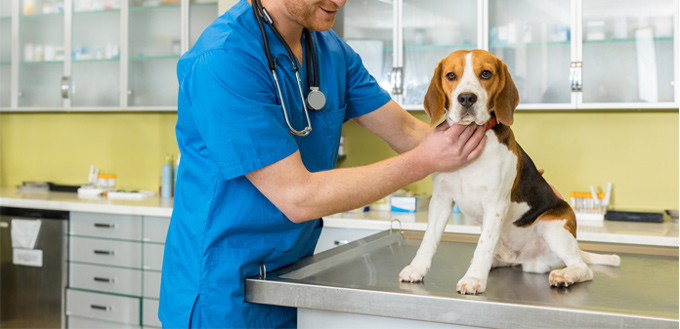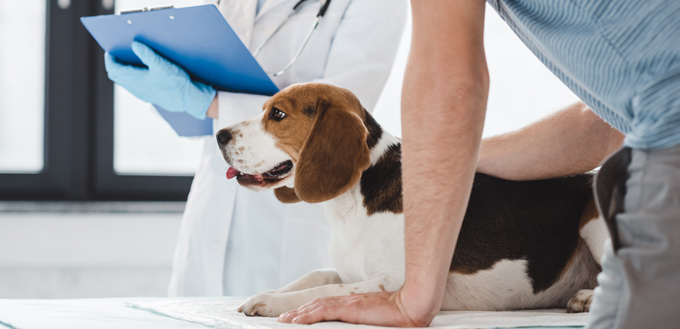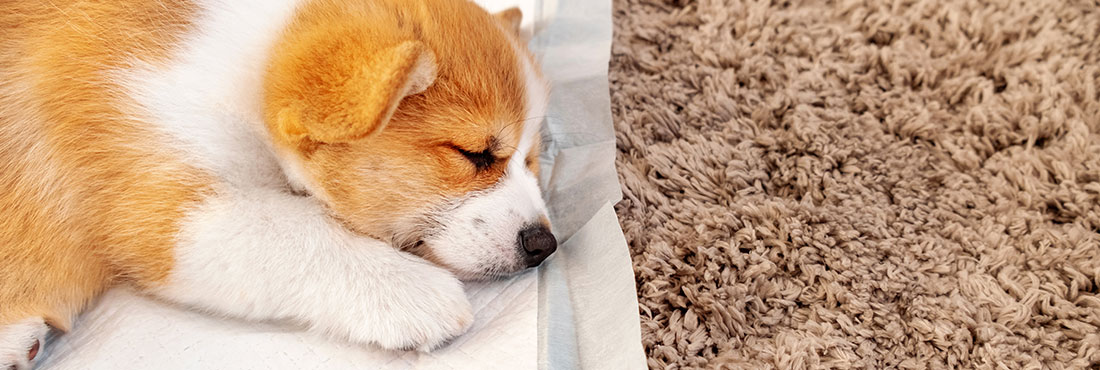If you’ve ever suffered from a UTI yourself, you’re bound to have sympathy with your poor dog if he or she develops the same condition. Dogs are made just as uncomfortable by a urinary tract infection as we humans are, so getting your pet some help is essential.
First, you need to find out for sure that your dog really does have a UTI. Getting confirmation from a vet should be your first step to officially diagnose the problem and to put in place the appropriate treatment.

What Are The Causes Of UTIs In Dogs?
Just as in humans, there are many causes of UTIs in dogs, and while most can easily be treated, others are much more serious and will require more intensive treatment. It’s therefore vital to check out the cause of your pet’s symptoms as early as possible to relieve their suffering and get them the treatment that they need.
Some of the causes of UTIs in dogs include:
- Crystals, debris accumulation and stones in the urethra or bladder
- Bladder infection or inflammation
- Incontinence from hormonal problems or a weak bladder
- Trauma
- Stress
- Cancer
- Congenital abnormalities
- Spinal cord abnormalities
- Prostate disease
Which Health Problems Could Lead To A UTI?
The most commonly seen urinary problem in dogs over the age of seven is incontinence due to weakness in the urinary sphincter muscle which allows the urine to leak and dribble out. Also commonly seen are bacterial infections, while endocrine conditions like diabetes mellitus and adrenal disease may also cause your pet to be more predisposed to bacterial infections in their urinary tract.
Dogs with diabetes and older females are the most prone to UTIs, however, there are several kinds of stones that develop in the bladder which form in particular conditions. Some are most commonly seen in old dogs, others in females, others in males, and some in particular breeds depending on different circumstances.

Symptoms Of UTI In Dogs
There are several symptoms that your dog may display if he or she has a UTI. Many are very similar to those experienced in humans when they have the same problem. Some signs to look for include:
- Very frequent urination
- Bloody urine
- Pain while urinating (indicating by whining or whimpering)
- Dribbling urine
- Straining while trying to urinate
- Breaking house training
- Frequently licking the genital area
- Strange smelling urine
- Drinking more water
- Weight loss
- Back pain
- Change in appetite
- Vomiting
- Lethargy
If your dog has been house trained for many months or years and then suddenly starts urinating in the house, that is one of the first signs of a potential UTI. You may also see pink or red in their urine, or notice that they urinate more often or for longer periods than usual.
Finding A Cause
To properly diagnose a UTI and to find its cause, you’ll need to get a urine sample for your vet to test. This can be easier said than done, however, it’s essential to find the white blood cells that indicate an infection, or crystals which indicate bladder stones. The urine sample also needs to be cultured for a few days to identify which bacteria is causing the problem.
If there is no urine culture test, your vet won’t know which antibiotic is the right one to treat the problem, or whether your dog actually needs an antibiotic at all. This test will also identify other more serious issues such as prostate or kidney infections.
There are several kinds of stones that dogs may develop in their urinary tract. These include struvite stones that often develop alongside bladder infections as well as calcium oxalate stones which are especially common in small breed dogs.
If your vet suspects that your dog may have bladder stones, they will take radiographs and blood tests to make a clear diagnosis. Sometimes, a cystoscopy or ultrasound may also be required to find stones.
Veterinary Treatments For UTI
Once the diagnosis has been made, an antibiotic such as Baytril for dogs can be supplied to treat infections, or a special diet can be recommended which will help to dissolve the stones. Some dogs will need both.
Prevention Of UTIs In Dogs
Although it’s hard to prevent your dog from developing a UTI or stones, encouraging your pet to drink more water is always a good idea. A drinking fountain is often a great way to encourage your dog to have more to drink since they are often attracted to running water. When dogs drink more, they urinate more, and that washes out the crystals which eventually turn into stones.
For dogs who suffer frequently from UTIs, vets often recommend taking probiotics to prevent the problem for recurring. Probiotics for dogs are believed to displace bacteria which causes infection while enhancing your pet’s immune system’s response.
You should also make sure that you keep your pet’s genital area well groomed and clean to avoid the transference of any bacteria, and make sure that you take them out for regular toilet breaks since if urine is allowed to just sit in their bladder, bacteria will have greater opportunity to multiply.
Related Post: Dog Water Fountain
Are There Any Home Remedies?
One of the recommended home remedies for humans who have frequent UTIs is cranberry juice, however, before giving any to your pet, it’s recommended that you seek advice from your vet since all dogs are unique and things that work for one could actually be dangerous for another.
Find cranberry supplements specifically formulated for dogs here.
What Might Happen If I Don’t Get My Dog’s UTI Treated?
If you don’t seem treatment for your dog’s UTI, the consequences could be quite serious. Even without taking into account your pet’s discomfort and pain, a bladder infection can migrate to the kidneys where it can result in a life-threatening infection. Stones may cause complete or partial urethral obstructions which could stop your pet from urinating altogether. This is a medical emergency which could cause the bladder to rupture or the kidneys to fail, and it could even be fatal for your pet if the obstruction isn’t removed immediately.
Sources:
- Lower Urinary Tract Problems and Infections in Dogs, WebMD
- Urinary Incontinence in Dogs, Best Friends Animal Society








